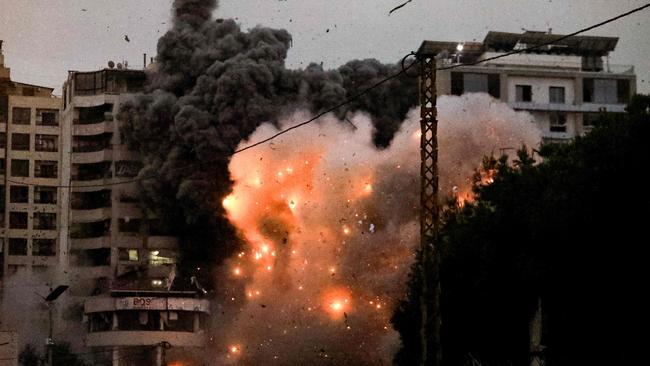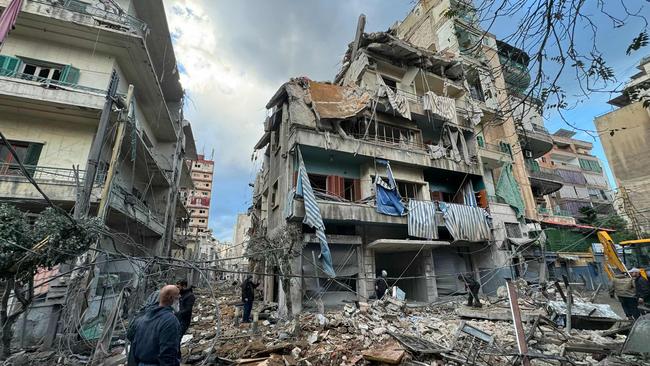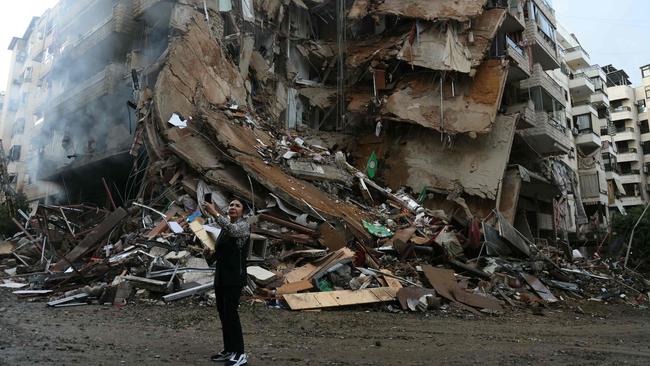War in Lebanon set to end for 60 days as Israel and Hezbollah move towards ceasefire
Israel is expected to approve a historic 60-day ceasefire with Hezbollah in Lebanon, paving the way for a possible permanent peace deal in the war-torn region.

Israel is expected to approve a historic 60-day ceasefire with Hezbollah in Lebanon, paving the way for a possible permanent peace deal in a major breakthrough for the war-torn region.
The deal, which was still awaiting approval by Israel’s cabinet, would see Hezbollah stop firing rockets into northern Israel and move its forces out of southern Lebanon. In return, Israel would stop bombing Hezbollah targets inside Lebanon and would withdraw its troops from southern Lebanon.
It would end for an increasingly bloody conflict that has killed more than 3000 people in Lebanon and almost 100 Israeli civilians and soldiers, while displacing about 60,000 people in northern Israel and about one million in Lebanon.
Israeli Prime Minister Benjamin Netanyahu had reportedly approved the ceasefire plan “in principle” and it was expected to be passed by his cabinet early Wednesday (AEDT), despite the opposition of some right-wing members of the coalition government.
Hezbollah’s chief supporter, Iran, has backed the ceasefire deal, wishing to preserve what remains of its damaged terrorist-proxy after a sustained military campaign by Israel against its leadership and its military facilities.

Hezbollah’s new leader, Naim Qassem, has said the group would agree to a ceasefire if Israel ended its attacks and Lebanon retained its sovereignty.
Hezbollah had initially said it would not agree to any ceasefire while the war continued in Gaza but it dropped that requirement after long-time leader Hasan Nasrallah was killed by Israel in Beirut in September.
The US has been pushing for a ceasefire deal, with White House national security spokesman John Kirby saying negotiations had been “constructive” and that “the trajectory of this is going in a very positive direction”.
But he added that “nothing is done until everything is done”.
One sticking point in negotiations had been Israel’s demand that it restart hostilities if Hezbollah broke the terms of the truce.
However, some right-wing members of the Netanyahu government said a ceasefire deal with Hezbollah now, when it has been greatly weakened by Israel’s offensive, was wrong and that Israel should continue to pursue the group until it was destroyed.
“An agreement with Lebanon is a big mistake. A historic missed opportunity to eradicate Hezbollah,” National Security Minister Itamat Ben-Gvir said.
“As I warned before in Gaza, I warn now as well: Mr Prime Minister, it is not too late to stop this agreement! We must continue until absolute victory!”

The ceasefire agreement was expected to be modelled on the last ceasefire in 2006 in which Hezbollah agreed to keep its forces away from southern Lebanon. However, Hezbollah eventually broke that deal and moved back into the south. Israel says any new agreement must have proper international oversight to ensure that Hezbollah complies with its terms.
The Lebanese Army is expected to deploy to southern Lebanon to ensure that Hezbollah stays north of the Litani River.
Hezbollah sought the ceasefire deal after being severely damaged by an intense Israeli offensive that began in September when Hezbollah-issued pagers and walkie-talkies exploded, killing and maiming many Hezbollah members and commanders.
Israel also killed not only Nasrallah but several of his successors.
Israel launched the offensive to stop the almost-daily rocket and missile attacks by Hezbollah into northern Israel, from which more than 60,000 Israelis have been displaced. Hezbollah started the attacks in support of Hamas after its October 7 massacre of 1200 Israelis last year.
In the hours ahead of the expected ceasefire agreement, both Hezbollah and Israel stepped up their attacks on the other.
Israeli officials said Hezbollah had fired at least 250 rockets into Israel on Sunday, including toward Tel Aviv, injuring at least 13 people and causing residents to scramble into bomb-shelters.
Meanwhile, the Israeli military said it had struck at least 25 Hezbollah targets across Lebanon, including compounds used by Hezbollah’s leadership and intelligence operations.




To join the conversation, please log in. Don't have an account? Register
Join the conversation, you are commenting as Logout